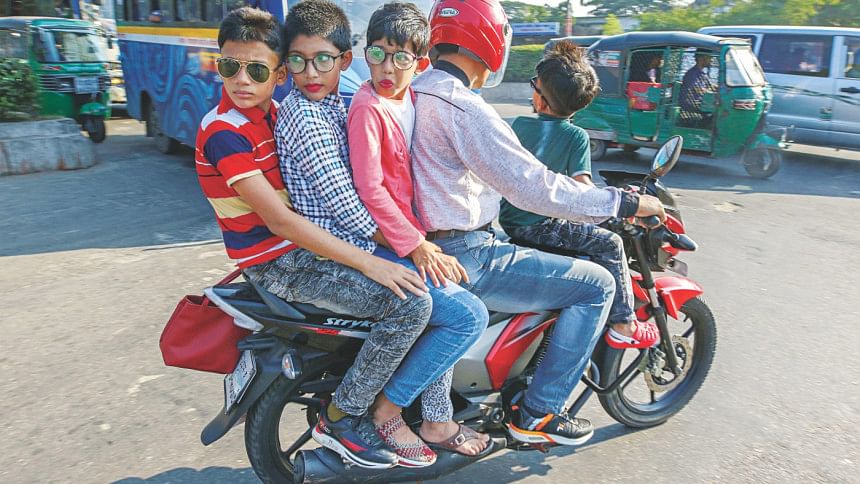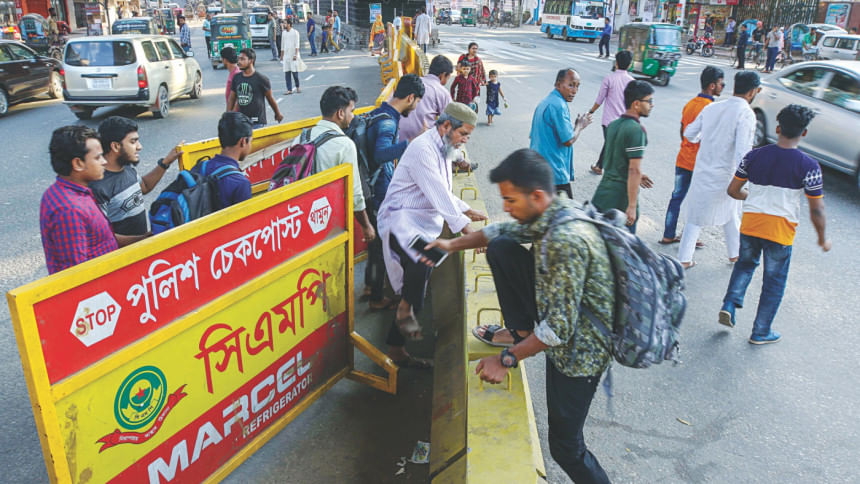Road Transport Act: BRTA, police not ready for enforcement

Although the much-talked-about Road Transport Act, 2018 came into effect yesterday, it could hardly be enforced anywhere in the country due to a lack of preparation from the authorities, especially the BRTA and the police.
In several places, including in the capital and Chattogram city, traffic police educated road rules violators about different provisions of the stringent law.
The law enforcers could not impose any on-the-spot fines as their point of sale (PoS) machines, providing instant challan, were not updated in with the new law and also due to the absence of other relevant documents.
Besides, mobile courts, run by the Bangladesh Road Transport Authority (BRTA), could not step in as the law was not incorporated in the schedule of the Mobile Court Act, 2009, said BRTA officials.

A schedule is a part of an act, often used to spell out in detail how the provisions would be in use.
The officials said the district administrations also could not operate mobile courts under executive magistrates over the same reason.
Asked why the schedule was not included in the mobile court act, Road Transport and Bridges Division Secretary Nazrul Islam said there was a “technical issue”.
“This is a matter related to the law and the home ministries. We are hopeful that the issue would be resolved by Sunday [tomorrow],” he said.
“There is no bar on implementing the law.”
WHAT THE LAW SAYS
On October 22, the Road Transport and Highways Division issued a gazette, stating that the Road Transport Act (RTA) would be effective from today. Parliament had passed the RTA in September last year, replacing the Motor Vehicle Ordinance, 1983.
According to section 105 of the new act, if anybody gets seriously injured or killed in a motor vehicle-related accident, it would be considered an offence under the relevant sections of the Penal Code-1860.
However, no matter what section 304(B) of the Penal Code contains, if anybody causes accident by reckless and negligent driving, and kills or injures someone severely, the person will face a maximum sentence of five years in jail or fine or both, reads section 105 of the RTA.
The offences that fall under section 105 are not bailable.
The maximum punishment under section 302 of the Penal Code is death penalty while it is life imprisonment under section 304(B).
The law also hands hefty fines for violation of traffic rules.
For driving without licence, the maximum penalty is six months in jail or a fine of Tk 25,000 or both. It is same for running unfit vehicles.
The maximum punishment for driving vehicles without registration is six months’ jail sentence or Tk 50,000 in fine or both. The highest punishment for honking banned horns is three months’ jail term or Tk 10,000 fine or both.
The law says the maximum punishment for illegally modifying vehicles’ body parts is three years’ jail sentence or Tk 3,00,000 fine or both.
According to the previous law, the maximum punishment for driving without licence was four months’ jail or Tk 500 fine or both. For driving vehicle without registration, the punishment was 3 months’ jail or Tk 2,000 fine or both (for first time) while for running unfit vehicles the punishment was three months in jail or Tk 2,000 fine or both.
Talking to reporters yesterday, Road Transport and Bridges Minister Obaidul Quader said the new law was enacted to bring discipline on roads and highways across the country.
“Our main target is to bring discipline on roads … it’s our challenge,” he said after visiting an under-construction flyover at Shafipur on Dhaka-Tangail highway.
THE FIRST DAY
On the first day of the implementation of the new law, The Daily Star correspondents in Dhaka, Chattogram and many other districts did not see any policemen imposing fines for traffic rules violations.
Around 3:30pm, a traffic policeman stopped a motorcycle near the capital’s Khamarbari intersection as the pillion rider was not wearing any helmet. He, however, let the biker go after warning him about the new law.
A traffic sergeant stopped a bus driver for violating road rules in Shahbagh area, but also allowed him to go without taking any fine from him.
Asked, the sergeant said, “Our PoS machines are taking updates. We are yet to get the case slips without which we can’t impose any fine.”
Another traffic sergeant deployed in Karwan Bazar area said he hands down fines to five to seven drivers every day, but yesterday no was fined by him.
“We mainly made drivers and pedestrians aware of the new law yesterday,” he said, wishing not to be named.
Mofizuddin Ahmed, additional commissioner (Traffic) of the Dhaka Metropolitan Police (DMP), said they stopped enforcing the previous law as it was replaced by the RTA yesterday.
He said preparations for implementing the new law was almost over and hoped that the situation would change in a day or two.
“We are expecting to get new case receipts within a day or two as we have already ordered printing the receipts,” he said, adding the PoS machines would also be ready soon.
“We started our groundwork immediately after the gazette was issued, our groundwork is at the final stage,” he added.
The additional commission further said that they will train some 800 traffic sergeants in the DMP areas on the new law.
The DMP commissioner will brief the media about the new law and its enforcement tomorrow, he said, adding that they would launch a massive awareness campaign for drivers, their helpers and the vehicle owners.
Joint Commissioner (traffic north) of DMP Md Abdur Razzak said they had already taken initiatives to distribute leaflets to raise awareness in this regard.
“We will also use loudspeakers to inform people about the new law and the punishments,” he said.
Road Transport and Bridges Division Secretary Nazrul Islam said several newspapers published government advertisements informing people about the RTA.
“We will also hold roadshows in the capital today under the leadership of Road Transport and Bridges Minister Obaidul Quader,” he added.


 For all latest news, follow The Daily Star's Google News channel.
For all latest news, follow The Daily Star's Google News channel. 



Comments